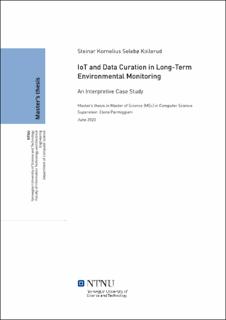| dc.contributor.advisor | Parmiggiani, Elena | |
| dc.contributor.author | Kollerud, Steinar Kornelius Selebø | |
| dc.date.accessioned | 2021-09-15T16:14:12Z | |
| dc.date.available | 2021-09-15T16:14:12Z | |
| dc.date.issued | 2020 | |
| dc.identifier | no.ntnu:inspera:57320302:33501895 | |
| dc.identifier.uri | https://hdl.handle.net/11250/2777844 | |
| dc.description.abstract | Forskningsinfrastrukturer for miljøovervåking har blitt mer regulert av styrende organer, som ESFRI, gjennom retningslinjer og krav for å motta finansiering. Disse retningslinjene har hovedsakelig et teknisk fokus, mens de komplekse sosio-tekniske relasjonene mellom forskerne og den tekniske infrastrukturen ved forskningsinfrastrukturer ofte blir neglisjert. Tidligere forskning viser at disse retningslinjene skaper spenninger for forskerne, ettersom de kontinuerlig må balansere ulike interesser fra forskjellige aktører i det daglige arbeidet. I tillegg, er arbeidsmetodene for datainnsamling under kontinuerlig utvikling. Utvikling av ny teknologi har ført til at arbeidet med datainnsamling har blitt mer sensorbasert og automatisert. Tidligere forskningsartikler tar for seg den økte betydningen av data curation, som følge av at forskningsinfrastrukturene blir mer tekniske og automatiserte.
Denne studien har som mål å bidra med ny empirisk innsikt om hvordan forskerne blir påvirket av å ta i bruk nye løsninger, ved å se på bruken av IoT-teknologi ved forskjellige forskningsinfrastrukturer, og hvordan det påvirker data curation, det økte fokuset på datadeling, og det daglige arbeidet til forskerne. Denne oppgaven tar i bruk et information infrastructure-perspektiv for å se på forskningsinfrastrukturer som komplekse sosio-tekniske infrastrukturer som er under kontinuerlig utvikling.
Denne casestudien er basert på kvalitative data: Intervjuer, observasjoner under seminarer og dokumentasjon for å svare på forskningsspørsmålene, og inkluderte intervjuer fra miljøforskere og andre aktuelle informanter som jobber ved forskningsorganisasjoner for miljøforskning. Funnene beskrev hvordan data curation kunne forbedre bruken av IoT, støtte distribuert datadeling og viktigheten av data curation for å sikre at vitenskapelige data er pålitelige. Videre identifiserte studien ekstraarbeidet som kreves fra forskere, og hvordan de påvirkes av manglende insentiver, tid og ressurser. | |
| dc.description.abstract | Research infrastructures for environmental monitoring has become more regulated by governing bodies, such as ESFRI, through policies and requirements to receive financing. These policies have a technical focus primarily, while the complex socio-technical relations present at research infrastructures often get neglected. Previous research shows that these policies cause tension for the researchers, as they have to continually balance the interests of different actors in their daily work. Furthermore, data collection methods evolve with the development of new technologies, becoming more sensor-based and automated. Previous articles address the increased importance of data curation, as the research infrastructures become more technical and automated.
This study aims to contribute with new empirical insight into how the researchers are affected by the adoption of new technologies, by looking at the use of IoT technology at different research infrastructures, and how it impacts the data curation, the increased focus on data sharing, and the researchers' daily work. This thesis adopts an information infrastructure perspective to view research infrastructures as continuously evolving and complex socio-technical infrastructure.
This interpretive case study relied on qualitative data: Interviews, observations during seminars, and documentation to answer the research questions, and included environmental researchers and other participants of interest working at environmental research organizations. The findings describe how data curation could improve the use of IoT, support distributed data sharing, and the importance of data curation to ensure that scientific data is trustworthy. Furthermore, this thesis identifies the extra work required by the researchers, and how they are affected by the lack of incentives, time, and resources. | |
| dc.language | | |
| dc.publisher | NTNU | |
| dc.title | IoT and Data Curation in Long-Term Environmental Monitoring | |
| dc.type | Master thesis | |
